Rat Control of Philadelphia
Welcome to Rat Control of Philadelphia! We are Pennsylvania rodent control specialists. Our specialty is rat and mouse control. Our special 32-point process is the single most effective method in the country for permanently solving rodent problems inside houses and buildings. We are not a typical pest control Philadelphia rodent exterminator company that treats rodents in a similar way to insects, with repeated monthly or quarterly poison treatments. That's a never-ending process. We solve the problem ONCE, and PERMANENTLY, by thoroughly inspecting every component of your building and completely sealing shut all access points, to 100% rodent-proof your house. We physically trap and remove all rats or mice, a process that is completely effective once all access has been closed. The problem is soved forever, usually in a week or less. Click on our Philadelphia Prices page to find out more about our prices for rat control work. Or give us a call any time to schedule an appointment, usually within the next day. We look forward to hearing from you.
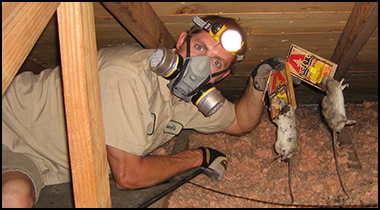
Philadelphia Rat Trapping

Rodent-Proofing Repairs
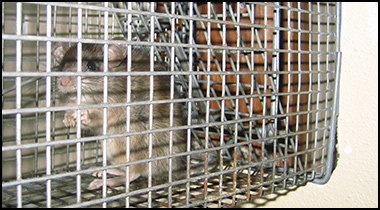
Humane Exclusion Options
Call 24/7 to discuss your rat problem.
Same-day or next-day appointments: 267-202-4325
32-point inspection of your property.
Written estimates for rat project.
Fully Pennsylvania licensed and insured.
Rat-proofing repairs with steel.
100% of rodents trapped and removed.
Chewed wire and damage repair services.
Rat dropping cleanup and sanitation services.
Poison-free rodent control methods.
Our Service Range - 267-202-4325
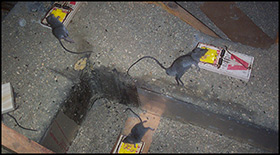
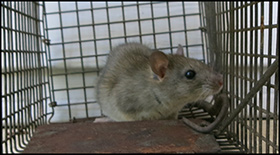
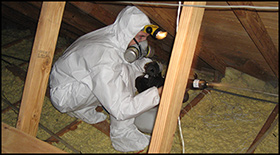
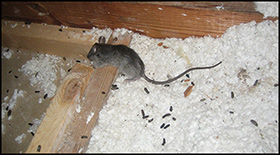
Yes! Rat feces, especially urine, can be deadly if you come into contact with it or breathe it in. Here are some of the diseases that can be contracted from rat to human:
1. Hantavirus Pulmonary Syndrome (HPS)
HPS is spread from inhaling the virus through rat droppings, urine and even the saliva of infected rats. It is a serious respiratory disease that is extremely deadly to humans, with symptoms usually appearing from 1 to 5 weeks after exposure. Some symptoms include muscle aches, fatigue and fever, coughing, tightness around the chest and shortness of breath. Although there is no known cure, persons exposed to rats and who are experiencing these symptoms should see a doctor immediately where they would more than likely be placed on oxygen and a ventilator.
2. Leptospirosis or Weil's Disease (a severe form of Leptospirosis)
This disease is spread from being in contact with rat urine, blood or tissue of infected rats. It is a type of bacterial infection that can cause organ failure such as brain, liver, lungs, heart and kidneys, leading to eventual death, with symptoms usually appearing from 2 to 30 days after being infected. Symptoms include mild flu-like symptoms, fever, chills, nausea, vomiting, muscle aches, loss of appetite, headaches and coughing. Treatment for this disease would be to issue antibiotics such as penicillin and doxycycline, intravenously, as well as connection to a ventilator if there are problems breathing. Should the kidneys be infected or damaged, the patient may need to undergo dialysis.
3. Salmonellosis
Spread by ingesting contaminated food that contains rat feces or urine. It is an intestinal bacteria disease that takes from between 12 to 72 hours before it becomes noticeable. Some persons may not even experience any symptoms at all and is not necessarily life threatening but it can be if the infection is spread further than the intestines. Symptoms include blood in the stool, fever, chills, diarrhea, abdominal cramps, headache, nausea and vomiting. Most times, salmonella is classified as a stomach flu called gastroenteritis with symptoms lasting from 2 to 7 days and diarrhea may last for up to 10 days. It may take several months before bowels regularize though. Anti-diarrhea and antibiotics may be used to treat salmonella and for more severe cases causing dehydration, may warrant hospitalization and for fluids to be administered intravenously.
4. Rat-Bite Fever (RBF)
RBF is spread through contaminated food or exposure to rat feces and urine of infected rats. RBF is a bacterial disease that can be fatal if left untreated. Symptoms may be experienced 3 days after exposure, but it can also take up to 3 weeks to show. Usually, a rash may appear on the hands and feet, lymph nodes may swell, and a repeated fever may occur. Other symptoms include joint pain, muscle pain, headache and vomiting. If left untreated, RBF can lead to meningitis, pneumonia, heart infections such as endocarditis, pericarditis or myocarditis and abscesses in the internal organs. Antibiotics are used to cure this disease; the most commonly issued drug is penicillin.

